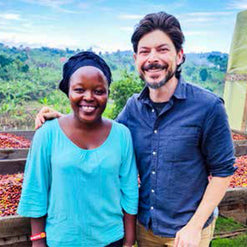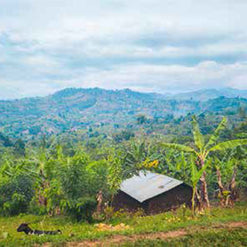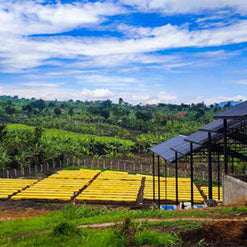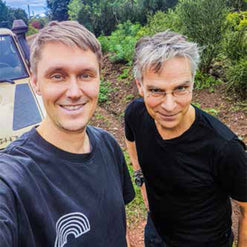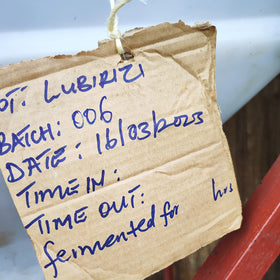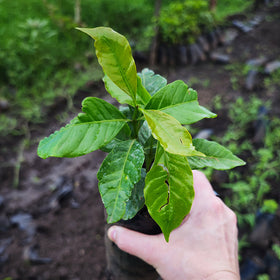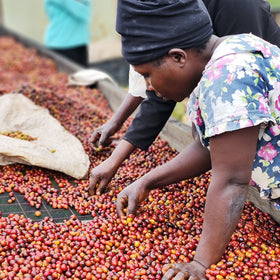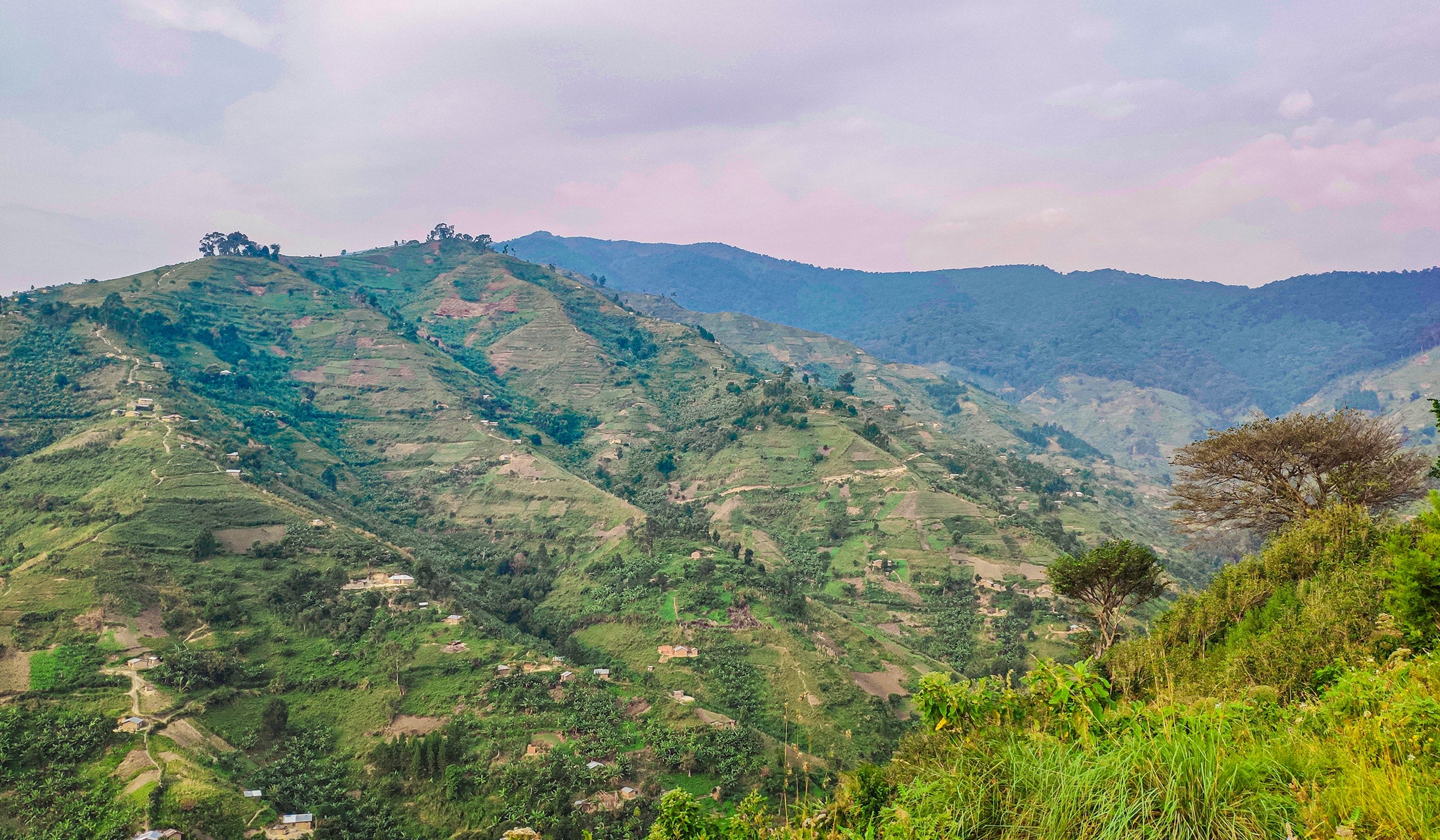
The Uganda Project
An interview with our co-founders Lars Pilengrim & Johan Wellander about Lykkes Farming Odyssey at the foot of Mount Rwenzori, Uganda.
SEPTEMBER 2023 | Written by Sara Steele

Part One: The project
Our project in Uganda is by far the biggest and most complex one yet. It involves aid organisation WeEffect, philanthropists, KFS (The Swedish Consumer Association), hundreds of workers and thousands of farmers. Although we grow, process and buy coffee here – our main mission of impact has less to do with beans and more so with social and societal initiatives.
“The Uganda project really represents the core goal of what we want to do at Lykke. Working with smallholder farmers, improve their coffee and take that coffee directly to a market we know so well. Then we make sure they get better pay and cut out all middlemen who don’t fill any function.” Lars Pilengrim says.
He and Johan Wellander, one of Lykkes board members, just recently got back from the first visit to our site in Uganda since before the pandemic. Uganda is not known for its coffee, unlike neighbouring countries like Kenya and Rwanda. So why here?
“I’ve known our now-partner Ben since 2012. I bought coffee from him in Burundi, which is a bit of a coffee underdog – which I personally like. Instead of buying from Rwanda which always shone brightly in the specialty coffee sky, it was a bit of fun to do something different. Burundi has the same varieties and conditions as Rwanda, and half the people running the washing stations were Rwandans who had fled the genocide. There was something in that storyline that intrigued me.
So, Ben (Benjamin Carlson, co-founder of Long Miles Coffee and our partner in Lunar Coffee) and I started talking about doing something together and that the underdog narrative really spoke to us both. That’s where Uganda came up. A former British colony where very few deal with speciality coffee but has SL-28 and SL-34 varieties which are superstars in Kenya. And the few who do work with speciality coffee operate in the eastern part of the country.
Naturally, we said ‘Then let’s do it in the western part!’” Lars laughs and continues.
“There’s a place right on the border of Congo with a mountain massif called Rwenzories which is magical and has all the right conditions to grow amazing coffee – but the know-how is very low. Perfect!”
Dreaming big is one thing, especially when the conditions are less than favourable. But how does one go about realising these dreams as a small, privately owned company?
“We want to deal with social entrepreneurship that makes a difference locally, but with the challenge that we’re only ONE actor trying to do something that requires an incredible amount of resources. How would we get it all together? So we started asking around and seeing what could be done - without any experience with aid organisations and how it works.
Part Two: WeEffect

"Then we were recommended to contact WeEffect, and after about 100 Zoom meetings it all came together."
Then we were recommended to contact WeEffect, and after about 100 Zoom meetings it all came together. The main thing that closed the circle was that Lykke wasn’t only going to make a difference on site and help farmers improve their coffee – we were also the buyer of the product, guaranteeing volume and security for the producers.” Johan says.
WeEffect is an aid organisation that works to make an impact in developing countries. When we teamed up with them, they represented an aid perspective – and we wanted to loan money as a private actor with the main interest that the producer should be able to grow coffee now and in the future. Two different worlds with common interests.
“Now that we have been there and seen how things have developed, we received proof after proof of what we have actually managed to achieve so far together. We have bought the coffee and the farmers have gotten far better pay” Lars says.
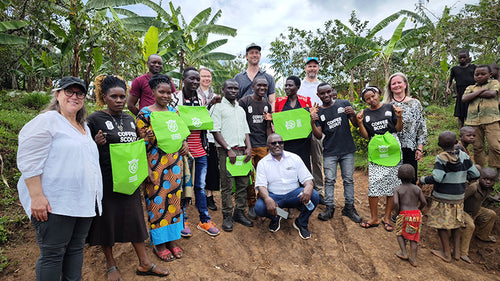
"Lykke is both the knowledge and the customer. We do and operate everything onsite."
WeEffect is the one who ties everyone together and is the guarantor that we do what we’re supposed to. We’re breaking new ground, and none of us have ever worked this way before. This is just the beginning of something that could become something much, much bigger.
Part Three: Social and societal impact
"If you can raise the quality and start paying premium dollars for their coffee, you have achieved a greater impact than any of us can imagine. Trade, not aid.”
Social and societal impact. Talking to the locals and producers in Rwenzori since Lunar Coffee arrived, there’s a clear and collective response: a bright future.
“From job shortage and plans on moving away, now the work opportunities have come here instead. This area has been put on the map.” Bright, who represents the voice of the youth in the sub-county committee, says.
Building and operating the process station created over 200 jobs, and Lykke is already working with over 2000 producers who get better pay for their cherries.
“You could tell that there was a mutual feeling of ‘Let’s do this!’, high ambition and overall positive winds,” Johan says brightly.
Coffee cultivation is a tale as old as time. One challenge can sometimes be to try and implement new ways of growing and processing with a farmer that has learned their ways from generations back. But here in Uganda, it’s actually different. Generally, the coffee production here is quite low, and farmers are growing other crops such as vegetables and coffee in a small-scale way. Therefore, they’ve taken care of the coffee in the same way as it has always been done, i.e. picking everything from green to yellow and red berries, drying them on the ground and so on. They have the trees but not the knowledge. It’s not like coming to the mega farmer in Brazil with monocultures who don’t want to change their way – this is people’s backyards we’re talking about. And there is a genuine interest in knowledge to produce more and better.
“In general, all producers live on what they grow in their own garden: corn, cassava, potatoes, etc. But coffee is the only cash crop they have that actually generates money, which in turn means education for their children and being able to buy books and other needed supplies. Many of them have between 50-300 dollars in annual income for an entire family. So if you can then help them increase production of their 200 coffee trees, say 2-3 times their normal harvest, that is a pretty drastic difference. And if you can also raise the quality and start paying premium dollars for their coffee, you have achieved a greater impact than any of us can imagine. Trade, not aid.” Johan says.
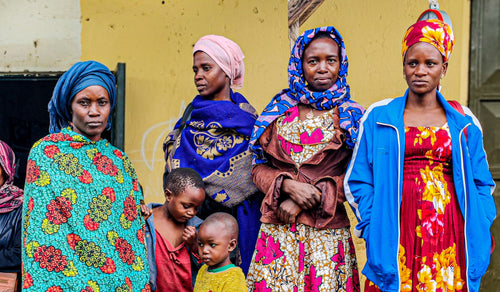
Part Four: Gender equality
"Now that she has started earning money and can support herself and the family, her two children are now finally in school.”
Gender Equality. Domestic violence and inequalities between men and women are a bit problem in Uganda, and it is something Lykke, WeEffect, KFS and the philanthropists are very passionate about.
“What was so incredibly striking was that at every single meeting, they talked about domestic violence. Women here are exposed both physically and financially. But as soon as a woman gets money, it will be taken care of and invested in good things, whereas their male counterparts tend to just… drink it away.
A woman who now works at the Lunar Coffee processing station told me her story about how she ended up here. She went by the building site, asking for work and saying that she could do anything – dig, build, whatever. She was asked to come the next day, and after some time they observed that she was extremely good at any task she took on, so she kept stepping up and up and now she is the one who receives and weighs the berries and documents everything.
She told me that she came from a situation at home that she wanted to get out of, which was the reason why she applied for the job. Now that she has started earning money and can support herself and the family, her two children are now finally in school.” Johan smiles.
Apart from WeEffect and KFS there are two philanthropists who finance the Uganda project. All of the interest that Lykke pays them back goes straight into new projects and initiatives that support women.

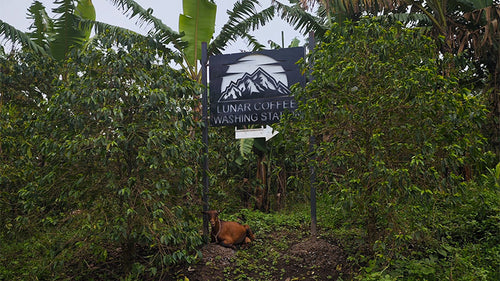
Part Five: Lunar coffee
“The whole thing has gone to proof of concept. Now it’s just a matter of doing it even more and even better.”
Lunar Coffee. So, we know the why, but not quite how Lykke’s Uganda project and thus, Lunar Coffee, came to life. Lars starts from the beginning.
“Coffee is grown at a higher altitude, and the higher the altitude, the slower the berries ripen and hence the better the quality of the coffee. The best coffee is at the very top, so of course we want to access the farmers who are on the highest grounds. But a farmer on high grounds isn’t very keen on moving even further up with their 200kg of cherries. That was the first rule when we were looking for land to set up our processing station: position ourselves close to, but on a lower altitude than the producers. Second, we needed access to electricity, water and roads.
A woman who now works at the Lunar Coffee processing station told me her story about how she ended up here. She went by the building site, asking for work and saying that she could do anything – dig, build, whatever. She was asked to come the next day, and after some time they observed that she was extremely good at any task she took on, so she kept stepping up and up and now she is the one who receives and weighs the berries and documents everything.
What we learned in Uganda compared to Burundi is that the farmers in Uganda are much more spread out, so that was one other thing to put into consideration. Then, when you wash the coffee you use a natural slope so that you can feed in the fresh berries at the top and then step by step sort them out, de-pulp, fermentation and on to the grading channels - everything is based on gravity. Finally, at the bottom, you need a multitude of drying tables.
So we found a piece of land that consists of 3 different lots put together, including a part that wedges itself into our land that we cannot buy as it is an old burial ground. Part of the charm!
Now, Lykke has a little over 1.5 hectares of land which will eventually need to expand for more drying tables in the long run.
Starting to build the processing station, it was basically impossible to get hold of an excavator, and the only available excavator was owned by a very opportunistic guy. Instead of 1 million Uganda shillings a day, (about the equivalent of 280 dollars), he wanted 8 million a day. So we decided this was a great opportunity to create work and hire people and spend the 2200 dollars on them instead – and so we did!
Now we needed to come up with a name, and since we were in Rwenzori, we started playing around with that. Rwenzori means Rainmaker, but popularly went by the name Mountains of the Moon, and ‘Lunar Coffee’ coffee was born”
Lunar Coffee is just at the beginning, but with hard proof that what we’re doing is working – and working well at that.
“With all the setbacks that have come - for example the pandemic - we have received a receipt for everything we have actually done. The feeling with the people at Lunar is that everyone wants to move forward. It is really a positive feeling and that everyone has a common higher purpose. We were fuelled with energy and now we just want to do more!” Johan says excitingly.
Lars chimes in. “The whole thing has gone to proof of concept. Now it’s just a matter of doing it even more and even better. My initial dream with Lykke felt real for the first time.”
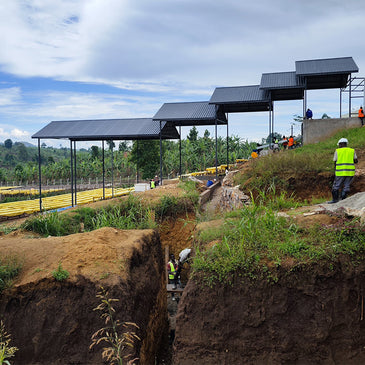
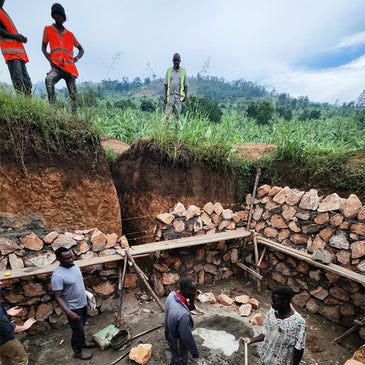
Part Six: The fruit of the project
It's finally here! the first harvest from Lunar Coffee, our joint venture with Long Miles Coffee project and the biggest thing to happen since Kaldi's goats decided to much on some Yemeni coffee berries. This is the start of a long journey together with local farmers and agronomers. We hope you're just as excited as us to see how the coffee quality improves from year to year as farmers become empowered.
African coffees are so unlike anything else that we roast here at Lykke. The high altitude and bountiful soil produce high-density beans packed full of organic acids and flavour compounds just waiting to be unlocked! Since this is our first African coffee in the 4 years since pen was first put to paper, a lot of planning and trial and error went into roasting these beans to perfection.
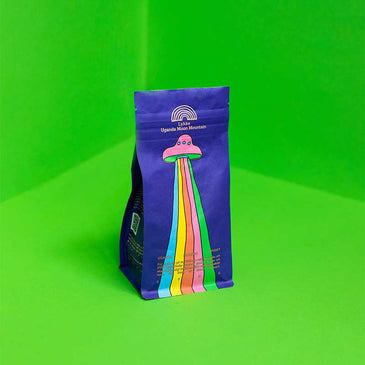
UFO 250g — Single origin Ugandan coffee
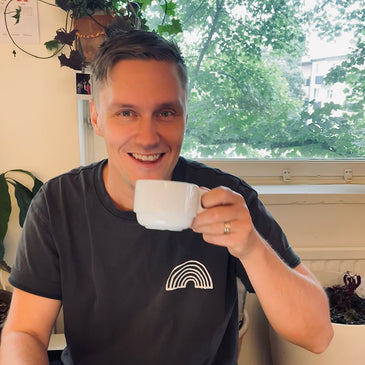
Lars Pilengrim finally drank UFO in September 2023.
...This is not the end. It is only the beginning....



